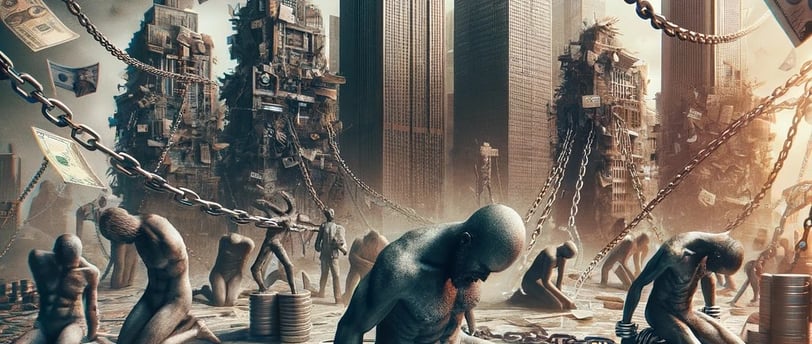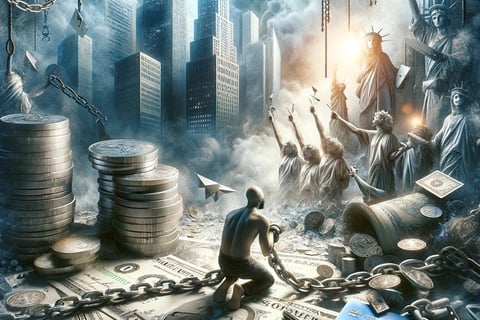Unraveling the Veil
The Monetary System's Mastery Over Society
NEWSFINANCE


In the theater of human progress, money has played a leading role, shaping the contours of societies and directing the course of nations. Yet, beneath its tangible utility lies a web of systemic beliefs and structures that wield profound influence over the fabric of life. This exploration delves into the heart of our monetary institution, peeling back layers to reveal its complexities, consequences, and the potential for transformative change.
The Genesis of Money and Its Creation
Money, in its contemporary form, emerges not from the wealth of natural resources or labor but from the depths of debt. A perplexing notion, yet central to understanding the monetary system's grip on global society. The process begins with governments or individuals borrowing from banks, which, through the alchemy of fractional reserve banking, conjure money from thin air. This system, sanctioned and perpetuated by central banks like the Federal Reserve, creates money through loans, ensuring that every dollar in circulation is mirrored by debt, demanding repayment with interest.
The Paradox of Interest
The imposition of interest on borrowed money introduces an inherent imbalance into the economy. The total money owed back to the banks invariably exceeds the money available in circulation, creating a cycle of perpetual debt. This mechanism ensures that defaults and bankruptcies are not anomalies but necessities, maintaining a state of economic servitude for the majority. The pursuit of profit through interest fundamentally undermines the potential for a debt-free society, chaining economies to a cycle of inflation and financial disparity.
The Illusion of Economic Freedom
The fractional reserve system, by design, fosters an environment of economic slavery. Money, created out of debt, necessitates continuous labor to repay loans, binding individuals to a relentless pursuit of financial stability. This systemic constraint on freedom is masked by the complexity and jargon of economics, obscuring the simple truth that the vast wealth and resources of the world are concentrated in the hands of a few. The result is a world where inequality and poverty coexist with unparalleled technological and material advancement.
The Hidden Tax of Inflation
Inflation, often perceived as an inevitable aspect of economic life, is revealed as a direct consequence of the fractional reserve banking system. The endless cycle of loan creation and interest repayment necessitates the constant expansion of the money supply, devaluing existing currency and eroding purchasing power. This inflationary pressure acts as a hidden tax on the population, disproportionately affecting those without the means to shield their wealth from the ravages of devaluation.
The Call for a Radical Revolution in Consciousness
The crisis facing humanity is not merely economic but existential, demanding a radical shift in consciousness. The societal structures and traditions that have long governed human affairs are proving inadequate in addressing the profound challenges of the present. The monetary system, with its roots in exploitation and inequality, stands as a barrier to the realization of a more equitable and sustainable world. Recognizing money's role as a social construct, subject to change and redefinition, opens the door to envisioning new forms of exchange and interaction that prioritize human well-being and ecological balance.
Towards a New Paradigm
The path to transcending the limitations imposed by the current monetary system lies in recognizing its constructed nature and the power inherent in collective choice. Money, as a tool, can be reimagined to serve the needs of society, fostering cooperation over competition, and sustainability over short-term gain. The journey toward this new paradigm begins with the acknowledgment of money's profound impact on social institutions and the collective responsibility to redefine its role in shaping the future.
In the grand narrative of human history, the chapter on money and its dominion over society is still being written. The revelations of its mechanisms of control and the potential for liberation through conscious change offer a compelling call to action. As individuals and communities awaken to the realities of the monetary system and its alternatives, the possibility of a more just and thriving world emerges, inviting us to reimagine the very foundations of societal wealth and success.



